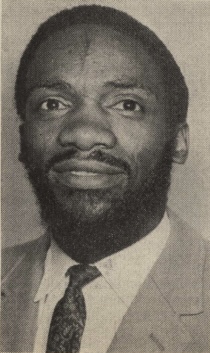Archie Mafeje | |
|---|---|
 Archie Mafeje in 1968 | |
| Born | Archibald Boyce Monwabisi Mafeje 30 March 1936 |
| Died | 28 March 2007 (aged 70) |
| Resting place | Ncambele, Tsolo, South Africa |
| Citizenship | |
| Education | Nqabara Secondary School Healdtown Comprehensive School University of Cape Town (BA, MA) King's College, University of Cambridge (PhD) |
| Known for | Mafeje Affair Anti-apartheid movement Decolonisation of African anthropology |
| Spouse | Shahida El Baz |
| Scientific career | |
| Fields | Social anthropology Political Anthropology Urban Sociology African history |
| Institutions | University of Dar Es Salaam Institute of Social Studies CODESRIA University of Namibia American University in Cairo |
| Thesis | Social and Economic Mobility in a Peasant Society: A Study of Commercial Farmers in Buganda (1968) |
| Doctoral advisor | Audrey Richards |
| Other academic advisors | Monica Wilson (MA) |
Archibald Boyce Monwabisi Mafeje (30 March 1936 – 28 March 2007), commonly known as Archie Mafeje, was a South African anthropologist and activist. Born in what is now the Eastern Cape, he received degrees from the University of Cape Town (UCT) and the University of Cambridge. He became a professor at various universities in Europe, North America, and Africa. He spent most of his career away from apartheid South Africa after he was blocked from teaching at UCT in 1968.
In exile, Mafeje participated in anti-apartheid activism. His work in anthropology was closely tied to his political activism, and he used his scholarship as a tool to critique the social and economic structures that underpinned the apartheid system in South Africa. He was particularly interested in land ownership and resource allocation issues, and argued that apartheid was built on a foundation of unjust land distribution and exploitation.
A Marxist, Mafeje as a social theorist was known for his critiques of colonialism, apartheid, and other forms of oppression in Africa. A prominent member of the African left, he was critical of Western academic traditions and argued for developing an African-centered approach to social theory and anthropology. Mafeje's Marxist perspective and his contributions to African social theory have impacted scholarship and activism in Africa and beyond. His work has influenced debates about African identity, autonomy, and independence.
© MMXXIII Rich X Search. We shall prevail. All rights reserved. Rich X Search
